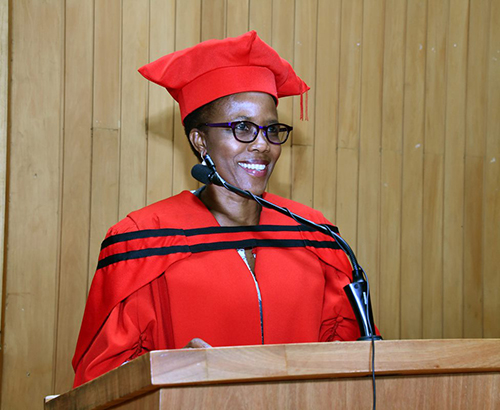
Towards the leading College of Law and Justice in Africa
Professor Puseletso Letete recently reflected on tax developments within the Southern African Development Community (SADC) during her inaugural lecture that took place on 25 August 2021. The inaugural lecture was presented under the theme “Tax policy gap in Southern African countries: Reflections on indirect tax coordination and tax diversity in the SADC post COVID-19”.

Prof Puseletso Letete
Why is the SADC important?
In her lecture, Letete explained that the reasons why countries belong to a regional economic community (also referred to as a bloc) are to increase intra-regional trade amongst member states, and to achieve free trade and free competition. “These attributes raise the standards of living in participating member countries.” she said. “This highlights the importance of the 16-member SADC bloc.”
The regional bloc consists of Angola, Botswana, the Comoros, the Democratic Republic of Congo, Lesotho, Madagascar, Malawi, Mauritius, Mozambique, Namibia, Seychelles, South Africa, Eswatini (previously known as Swaziland), Tanzania, Zambia and Zimbabwe.
Letete cited the April 2020 SADC report on the impact of the COVID-19 pandemic on the community’s economy, which projected that with the decline in economic activity and in commodity prices, government revenues are expected to fall drastically.
Key research questions
Primarily, the inaugural lecture focused on the following research questions regarding the challenges that the regional bloc faces:
Letete stated that some researchers have shown that regional economic communities have had only a small positive though uneven effect on intra-African trade. She went further by quoting research which, in assessing the performance of regional blocs in Africa, concludes that member countries have failed to achieve their objective of increasing intra-regional trade significantly, in particular, and fostering general policy coordination.
Furthermore, said Letete, the main challenge that these writers point to, is that potential revenue losses have been a key obstacle to broader trade liberalisation.
Towards a common taxation system
Letete said that the SADC member states have undertaken a legal and political commitment to establish a closer common system of indirect taxation. “This flows from articles 21 and 22 of the SADC Treaty, where members commit to cooperate on matters of trade and finance and develop protocols for closer cooperation,“ she said. “Subsequently, member states developed specific legislation that deal with different tax matters. The adoption of these legal instruments indicates commitment to establishing a common system in indirect taxation.”
Peer praise
In her response to Professor Letete’s inaugural lecture, Professor Annet Wanyana Oguttu, (Acting Head, Department of Taxation, University of Pretoria) had this to say: “Professor Letete is among the few legal scholars that have contributed to research on this subject. Her inaugural lecture displays her continued commitment to highlight tax matters that have an impact on effective economic integration in the SADC region, which is essential to ensure economic development for the region. The lecture highlights that tax coordination is essential to ensure economic regional integration. In this regard, the SADC member countries adopted tax policies to enhance tax cooperation and coordination. Professor Letete’s inaugural lecture has given insight into the technical principles that underline the operation of indirect taxes in the SADC region.”
Interests and career highlights
Speaking after the lecture, Letete said that her research interests include tax law, value-added tax law in a cross-border context in the SADC and SACU regions, tax policy, and tax administration.
“I chose this profession because there are so few tax lawyers, and even fewer women tax lawyers, in Lesotho, my country of origin, as well as in most countries in the SADC,” she said.
Letete is currently supervising three doctoral and five master’s students in tax law.
In conclusion, Letete said that the legacy she would want to leave would be her efforts to ensure that postgraduate students do research that will benefit their communities and society, particularly in the SADC region and Africa. “I want to encourage students to participate in community-engaged scholarship and to bring creativity to tax law research“, she said. “I would also like to mentor more emerging women academics and see more women joining academia.”
* By Ngwako Mokgotho, Communications and Marketing Specialist, College of Law
Publish date: 2021-09-10 00:00:00.0